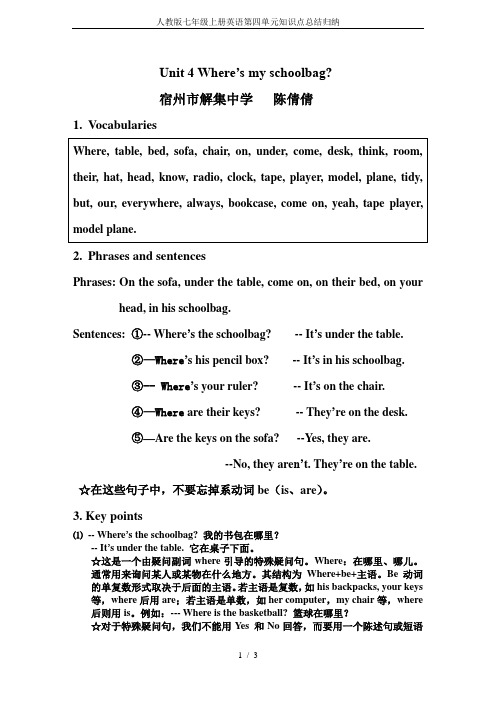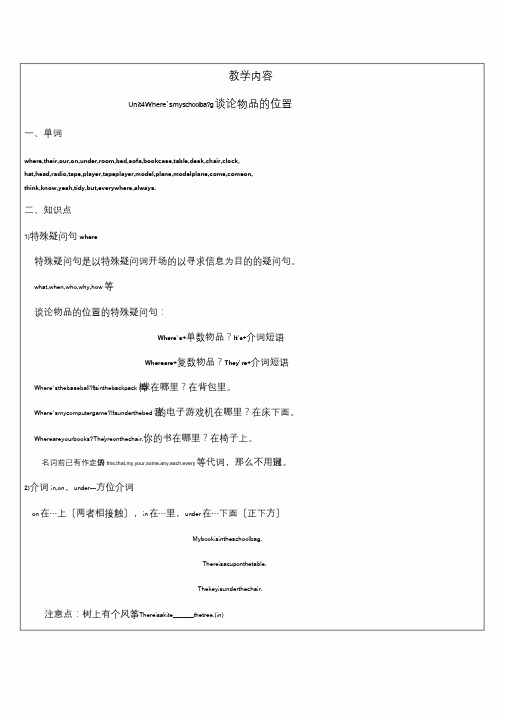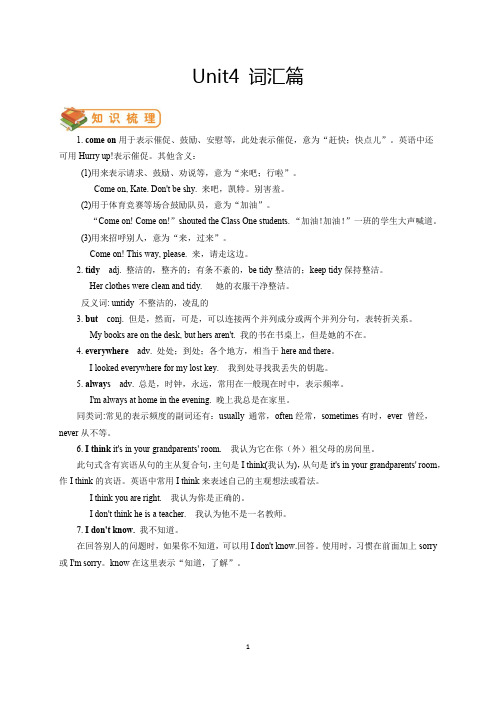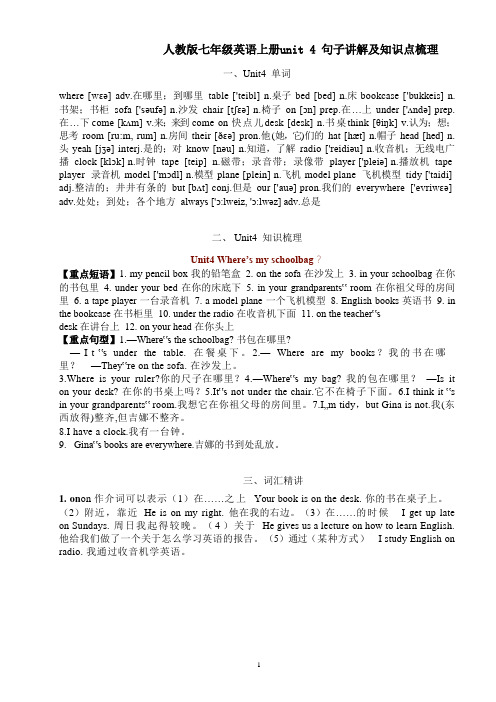人教版-七年级上册-英语知识点-全---第四单元-unit-4-知识点
人教版七年级上册英语第四单元知识点总结归纳

Unit 4 Where’s my schoolbag?宿州市解集中学陈倩倩1.Vocabularies2.Phrases and sentencesPhrases: On the sofa, under the table, come on, on their bed, on your head, in his schoolbag.Sentences:①-- Where’s the schoolbag? -- It’s under the table.②—Where’s his pencil box? -- It’s in his schoolbag.③-- Where’s your ruler? -- It’s on the chair.④—Where are their keys? -- They’re on the desk.⑤—Are the keys on the sofa? --Yes, they are.--No, they are n’t. They’re on the table. ☆在这些句子中,不要忘掉系动词be(is、are)。
3. Key points⑴-- Where’s the schoolbag? 我的书包在哪里?-- It’s under the table. 它在桌子下面。
☆这是一个由疑问副词where引导的特殊疑问句。
Where:在哪里、哪儿。
通常用来询问某人或某物在什么地方。
其结构为Where+be+主语。
Be动词的单复数形式取决于后面的主语。
若主语是复数,如his backpacks, your keys 等,where后用are;若主语是单数,如her computer,my chair等,where 后则用is。
例如:--- Where is the basketball? 篮球在哪里?☆对于特殊疑问句,我们不能用Yes 和No回答,而要用一个陈述句或短语来作出明确的回答,说明某物在某个地方。
七上英语第四单元知识点归纳

第四单元是关于“时间”的内容。
以下是七年级上册英语第四单元的知识点归纳:1. 时间表达:-问时间:What time is it?(现在几点了?)-回答时间:It's + 小时+ 点钟。
例如:It's nine o'clock.(九点钟。
)-问日期:What's the date today?(今天几号?)-回答日期:It's + 月份+ 日。
例如:It's September 15th.(九月十五日。
)2. 一天的时间段:- morning(早上)- afternoon(下午)- evening(晚上)3. 一周的天数:- Monday(星期一)- Tuesday(星期二)- Wednesday(星期三)- Thursday(星期四)- Friday(星期五)- Saturday(星期六)- Sunday(星期日)4. 日常活动和时间:- get up(起床)- have breakfast(吃早餐)- go to school(去学校)- have lunch(吃午饭)- do homework(做作业)- have dinner(吃晚饭)- go to bed(上床睡觉)5. 询问和回答活动发生的时间:- What time do you...?(你什么时间...?)- I... at + 时间。
例如:I get up at seven o'clock.(我七点钟起床。
)6. 表示频率的副词:- always(总是)- usually(通常)- often(经常)- sometimes(有时候)- rarely(很少)- never(从不)7. 词汇扩展:-月份:January(一月)、February(二月)、March(三月)、April(四月)、May(五月)、June(六月)、July(七月)、August(八月)、September (九月)、October(十月)、November(十一月)、December(十二月)-季节:spring(春天)、summer(夏天)、autumn/fall(秋天)、winter (冬天)以上是关于七年级上册英语第四单元的知识点归纳。
人教版七年级英语上册1--4单元知识点总结

人教版七年级英语上册1--4单元知识点总结人教版七年级英语上册unit1-Unit4识点总结七年级一、句型及短语总结1.what’s=what is是什么What’s this?这是什么?It is a quilt.它是一床被子。
what’s that?那是什么?It is an orange.它是一个橙子。
name名字your name你的名字What’s your name?你的名字是什么?=你叫什么名字.My name is Dale.我的名字叫戴尔.What’s his name?他叫什么名字?What’s her name?她叫什么名字?What’s its name?它叫什么名字?subject学科favorite subject最喜欢的学科Your favorite subject你最喜欢的学科W hat’s your favorite subject?你就最喜欢的学科是什么?=你最喜欢什么学科?matter/mætə/n. 问题,事情What’s the matter?问题是什么?=怎么了?单数形容词性物主代词:my我的your你的his他的its/its/它的These books are mine and those are yours.这些书是我的,那些书是你的。
His watch is ugly but mine(my watch)is beautiful.他的手表很丑,而我的很漂亮。
My parents are always hard on me but hers always gentle.我的父母对我总是很苛刻,但她的父母总是很温柔。
单数名词性物主代词:mine我的yours你的his他的hers她的its它的Our English teacher Miss wang is beautiful.我们的英语老师王老师很漂亮。
Their English teacher is strict with them.他们的英语老师对他们很严格。
人教版英语七年级上册Unit4知识点

教学内容Unit4Where’smyschool b a?g谈论物品的位置一、单词where,their,our,on,under,room,bed,sofa,bookcase,table,desk,chair,clock,hat,head,radio,tape,player,tapeplayer,model,plane,modelplane,come,comeon,think,know,yeah,tidy,but,everywhere,always.二、知识点1)特殊疑问句where特殊疑问句是以特殊疑问词开场的以寻求信息为目的的疑问句。
what,when,who,why,how等谈论物品的位置的特殊疑问句:Where’s+单数物品?It’s+介词短语。
Whereare+复数物品?They’re+介词短语。
Where’sthebaseball?I’t sinthebackpack棒.球在哪里?在背包里。
Where’smycomputergame?I’t sunderthebed我.的电子游戏机在哪里?在床下面。
Whereareyourbooks?The’y reonthechair.你的书在哪里?在椅子上。
名词前已有作定语的this,that,my,your,some,any,each,every等代词,那么不用冠词。
2)介词in,on,under---方位介词on在⋯上〔两者相接触〕,in在⋯里,under在⋯下面〔正下方〕Mybookisintheschoolbag.Thereisacuponthetable.Thekeyisunderthechair.注意点:树上有个风筝。
Thereisakite______thetree.(in)树上有个苹果。
Thereisanapple______thetree.(on,树上长的、结的)墙上有副画。
Thereisapicture______thewall.(on)墙上有扇窗户。
人教版初一上册英语第四单元unit 4词汇篇

Unit4 词汇篇1. come on用于表示催促、鼓励、安慰等,此处表示催促,意为“赶快;快点儿”。
英语中还可用Hurry up!表示催促。
其他含义:(1)用来表示请求、鼓励、劝说等,意为“来吧;行啦”。
Come on, Kate. Don't be shy. 来吧,凯特。
别害羞。
(2)用于体育竞赛等场合鼓励队员,意为“加油”。
“Come on! Come on!”shouted the Class One students. “加油!加油!”一班的学生大声喊道。
(3)用来招呼别人,意为“来,过来”。
Come on! This way, please. 来,请走这边。
2. tidy adj. 整洁的,整齐的;有条不紊的,be tidy整洁的;keep tidy保持整洁。
Her clothes were clean and tidy.她的衣服干净整洁。
反义词: untidy 不整洁的,凌乱的3. but conj. 但是,然而,可是,可以连接两个并列成分或两个并列分句,表转折关系。
My books are on the desk, but hers aren't. 我的书在书桌上,但是她的不在。
4. everywhere adv. 处处;到处;各个地方,相当于here and there。
I looked everywhere for my lost key.我到处寻找我丢失的钥匙。
5. always adv. 总是,时钟,永远,常用在一般现在时中,表示频率。
I'm always at home in the evening. 晚上我总是在家里。
同类词:常见的表示频度的副词还有:usually 通常,often经常,sometimes有时,ever 曾经,never从不等。
6. I think it's in your grandparents' room. 我认为它在你(外)祖父母的房间里。
人教版七年级英语上册unit 4 句子讲解及知识点梳理

人教版七年级英语上册unit 4 句子讲解及知识点梳理一、Unit4 单词where [wɛə] adv.在哪里;到哪里table ['teibl] n.桌子bed [bed] n.床bookcase ['bukkeis] n. 书架;书柜sofa ['səufə] n.沙发chair [tʃɛə] n.椅子on [ɔn] prep.在…上under ['ʌndə] prep. 在…下come [kʌm] v.来;来到come on 快点儿desk [desk] n.书桌think [θiŋk] v.认为;想;思考room [ru:m, rum] n.房间their [ðɛə] pron.他(她,它)们的hat [hæt] n.帽子head [hed] n. 头yeah [jʒə] interj.是的;对know [nəu] n.知道,了解radio ['reidiəu] n.收音机;无线电广播clock [klɔk] n.时钟tape [teip] n.磁带;录音带;录像带player ['pleiə] n.播放机tape player 录音机model ['mɔdl] n.模型plane [plein] n.飞机model plane 飞机模型tidy ['taidi] adj.整洁的;井井有条的but [bʌt] conj.但是our ['auə] pron.我们的everywhere ['evriwɛə] adv.处处;到处;各个地方always ['ɔ:lweiz, 'ɔ:lwəz] adv.总是二、 Unit4 知识梳理Unit4 Where’s my schoolbag?【重点短语】1. my pencil box 我的铅笔盒 2. on the sofa 在沙发上 3. in your schoolbag 在你的书包里4. under your bed 在你的床底下 5. in your grandparents‟ room 在你祖父母的房间里 6. a tape player 一台录音机7. a model plane 一个飞机模型8. English books 英语书9. in the bookcase 在书柜里10. under the radio 在收音机下面11. on the teacher‟sdesk 在讲台上12. on your head 在你头上【重点句型】1.—Where‟s the schoolbag? 书包在哪里?—I t ‟s under the table. 在餐桌下。
人教版七年级上册英语Unit 4知识点梳理及语法讲义(教师版)

七年级上册英语Unit 4知识点与语法精讲精练词汇梳理(一)完成单词梳理:名词:1. table桌子 2. bed 床 3. bookcase 书架;书柜4. sofa 沙发5. chair 椅子6. desk 书桌7. room 房间8. hat 帽子9. head 头10. radio 收音机11. clock 时钟12. tape 磁带;录音带13. player 播放机14. model 模型15. plane 飞机动词:1. come 来;来到 2. think 认为;想;思考 3. know 知道;了解代词:1. their 他(她、它)们的 2. our 我们的介词:1. on 在……上 2. under 在……下副词:1. where 在哪里;到哪里 2. everywhere 处处;到处;各个地方3. always 总是连词:1. but 但是形容词:1. tidy 整洁的;井井有条的感叹词:1. yeah 是的;对(二) 词汇变形小结:1. they (人称代词主格:他/她/它们) — them (人称代词宾格) — their (形容词性物主代词:他/她/它们的) — theirs (名词性物主代词:他/她/它们的)2. tidy (adj. 整洁的) — untidy (反义词:不整洁的)3. radio (n. 收音机) — radios (复数)4. we(人称代词主格:我们) — us (人称代词宾格) — our (形容词性物主代词:我们的) — ours (名词性物主代词:我们的)【练一练】用所给词的适当形式填空1.Look! Those are four beds (bed) in my house.rry and I are Bill’s daughters, so Bill is our (we) father.3.Those old CD players ( player) are very nice.4.Susan and Emma thank their (they) teacher for helping them find the keys.5.Tina comes (come) to the gym and plays sports.6.These rooms (room) are too small.7.Look! Your model plane is (be) on the sofa.8.The Chinese book is his (he).9.Look at my mother’s (mother) room. It’s very clean.10.These are their (they) baseballs.(三) 短语攻关:come on快点儿tape player 磁带播放机model plane飞机模型on the sofa 在沙发上in one’s schoolbag在某人的书包里under one’s bed 在某人的床下面on one’s head在某人的头上teacher’s desk 讲桌pencil box 铅笔盒computer game电脑游戏知识点梳理1. Where are my books? 我的书在哪里?【用法详解】“Where+be动词+主语?”该句型为where引导的特殊疑问句,用来询问“某人或某物在哪里?”。
人教版七年级英语上册Unit4 单词 知识梳理 词汇句式精讲

人教版七年级英语上册Unit4单词知识梳理词汇句式精讲Unit4 单词where [wɛə] adv.在哪里;到哪里table ['teibl] n.桌子bed [bed] n.床bookcase ['bukkeis] n.书架;书柜sofa ['səufə] n.沙发chair [tʃɛə] n.椅子on [ɔn] prep.在…上under ['ʌndə] prep.在…下come [kʌm] v.来;来到come on 快点儿desk [desk] n.书桌think [θiŋk] v.认为;想;思考room [ru:m, rum] n.房间their [ðɛə] pron.他(她,它)们的hat [hæt] n.帽子head [hed] n.头yeah [jʒə] interj.是的;对know [nəu] n.知道,了解radio ['reidiəu] n.收音机;无线电广播clock [klɔk] n.时钟tape [teip] n.磁带;录音带;录像带player ['pleiə] n.播放机tape player 录音机model ['mɔdl] n.模型plane [plein] n.飞机model plane 飞机模型tidy ['taidi] adj.整洁的;井井有条的but [bʌt] conj.但是our ['auə] pron.我们的everywhere ['evriwɛə] adv.处处;到处;各个地方always ['ɔ:lweiz, 'ɔ:lwəz] adv.总是02Unit4 知识梳理Unit4 Where’s my schoolbag?【重点短语】1. my pencil box 我的铅笔盒2. on the sofa 在沙发上3. in your schoolbag 在你的书包里4. under your bed 在你的床底下5. in your grandparents’room 在你祖父母的房间里6. a tape player 一台录音机7. a model plane 一个飞机模型8. English books 英语书9. in the bookcase 在书柜里10. under the radio 在收音机下面11. on the teacher’s desk 在讲台上12. on your head 在你头上【重点句型】1.—Where’s the schoolbag? 书包在哪里?—I t ’s under the table. 在餐桌下。
- 1、下载文档前请自行甄别文档内容的完整性,平台不提供额外的编辑、内容补充、找答案等附加服务。
- 2、"仅部分预览"的文档,不可在线预览部分如存在完整性等问题,可反馈申请退款(可完整预览的文档不适用该条件!)。
- 3、如文档侵犯您的权益,请联系客服反馈,我们会尽快为您处理(人工客服工作时间:9:00-18:30)。
Unit4重点词汇:where、table、bed、bookcase、sofa、chair、on、under、come、desk、tidy、always...1、重点短语:on the sofa 在沙发上on the table 在桌上on your head 在你的头上under the chair在椅子下&under the bed 在床下under the table 在桌下in your schoolbag 在你的书包里in the bookcase 在书柜里in your grandparents’ room 在你爷爷奶奶的房间里come on 快点2、where引导的特殊疑问句,用于询问“某人或某物在哪里”,若谓语动词为be动词,其结构为“Where + be + 主语?”,be动词要与后面的主语保持一致。
其答语,用“主语+be+表示地点的的介词短语”为避免重复,句中的主语一般用代词代替。
----Where is/are...?----It’s/They’re on /in/under...…----Where is my English book?----It’s on the desk.1)My clock is on the table?(就画线部分提问)________ ________ your clock?2)你的爸爸在哪?(翻译下列句子)______________________________________________3、on 在……的上面(接触)on the sofa/desk/table/bed on the tree 在树上(本身固有的)in 在……的里面in your schoolbag/room in the tree 在树上(外来的事物)}under 在……的下面(正下方)under your bed/desk若表示“某物在某地”则用“物+ be + 介词短语”结构。
e.g. It’s under your bed.( )The teaching building has five floors. My classroom is _______the third floor.A.onB. atC. toD. on()My baseball is _______the floor, _______the table.A. on;underB. on;onC. under;underD.under;on,6、含有介词短语的陈述句变一般疑问句步骤:1)把be动词放在句首;2)注意第一人称和第二人称的转换;3)把句号改为问号;4)用yes和no 来回答。
e.g. The keys are on the sofa .-------Are the keys on the sofa?将下列陈述句改为一般疑问句;The new pen is in my schoolbag._____________________________________His coat is on his bed._____________________________________________The books are on the table._________________________________________7、come on “快点;加油” e.g. Come on, it’s getting dark.$1)“来吧,行啦”用来表示请求、鼓励、劝说等;e.g. Come on, Kate. Don’t be shy.2)“加油”,用于体育竞赛等场合鼓励队员;e.g. “Come on!” shouted the Class One students.3)“来,过来”,用于招呼别人e.g. Come on! This way, please.( )__________,we’ll be late.A. ComeB. Come inC. Come onD. Go:8、I don’t know.(don’t = do not)know “认识,知道”为实意动词,其否定形式应借助于助动词do或does,再加not 构成。
除第三人称用doesn’t外,其他人称均用don’t.(注意动词须用原形)e.g. He doesn’t know.She ________(know) his name.(填动词的正确形式)9、tidy 1)adj.“整洁的、整齐的”,常见短语:be tidy 整洁的;keep tidy 保持整洁;a tidy+n.一个整洁的……e.g. The room is very tidy./He is a tidy boy.2)v(及物动词),“使整洁”,短语:tidy (up) sth.使某物整洁e.g. I must tidy(up)my room.)3)v(不及物动词),“收拾,整理”,短语:tidy up 收拾,整理e.g. Please tidy up after dinner.9、but 连词“但是,然而”,表转折关系,可以连接两个并列成分或分句,不能与though/although 同时出现在一个句子中。
and 连词“和、同、与”,常用于表示并列关系或意义的递进,意为“而且”。
e.g. I’m tidy,but Gina is not.He knows me and I know him.( )Tony is a quiet student, ________he is active in classA. soB. andC. butD.or'10、everywhere adv. “到处、各个地方”,不能在其前使用in、at、to ,可做表语。
========everyplacee.g. In spring ,we can see flowers everywhere. Dust is everywhere.(作表语)He follows me everywhere and it makes me feel so trapped.(我觉得我被困住了)We shouldn’t throw rubbish_______(到处)to protect the environment.11、always 频度副词,“总是”,1)一般用于一般现在时中;2)通常放在助动词、be动词、情态动词之后,行为动词之前;注意:1)always 后面的动词用一般现在时,主语是第三人称单数,动词应用三单形式,其他用原形;2)对频度副词提问,用——how often3)常见的频度副词还有:usually, often, sometimes, ever, never等。
~e.g. I always watch TV at night./She always likes to ask why.(放在动词前)In much of China,spring is always very short.(放在be动词之后)The trains are always on time.He can’t always do the same thing.(用于情态动词后)( )---Do you often go fishing with your father?---Yes, _____.I like fishing very much.A.neverB. alwaysC. ever12、ask 1)v.(及物动词)“问,询问”[e.g. Don’t ask me---I don’t know.2)v.(不及物动词)“问”e.g. If you don’t know,you must ask.相关短语:ask for 要求,请求ask sb. for help 向某人寻求帮助ask sb.(not)to do sth. 要求某人(不要)做某事【能力提升】】根据句意及首字母提示完成单词…1.My schoolbag is u______ the table.2.I have a c____. It can tell me the time.3.He is a boy, b____ I’m a girl.4.Gina’s book is everywhere. She isn’t t_______.5 ---W______ are my CDs? ---They are on the table.】句型转换1.His key are on the table.(对画线部分提问)_______ _______ his keys?2.I know his name.(改为否定句)I _______ _______ his name.3.They’re on the chair.(改为单数形式的句子)_______________________________________________4.It’s in the schoolbag.(改为复数形式的句子)______________________________________________5.This is my room.(改为一般疑问句,并作出肯定回答)----________this ________ room?----________, _______ _______.。
